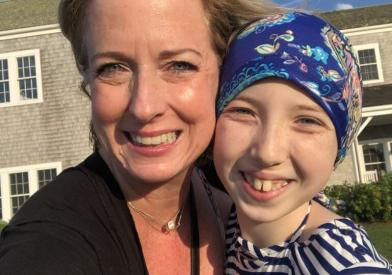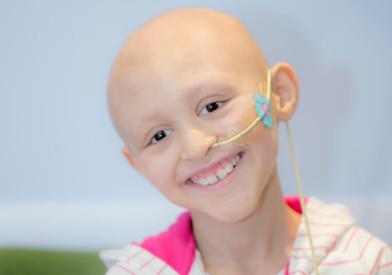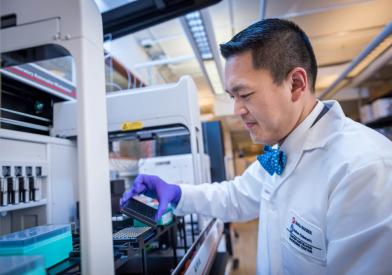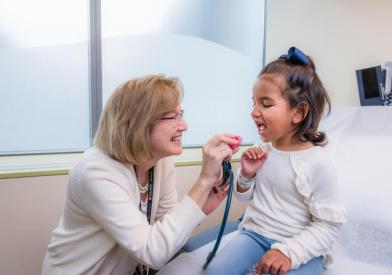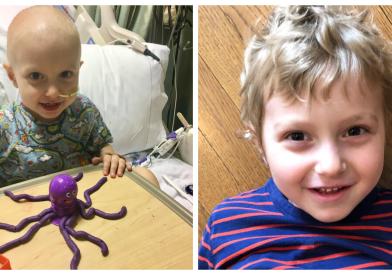
About the Pediatric Carcinoma Clinic
The Pediatric Carcinoma Clinic at Dana-Farber/Boston Children's Cancer and Blood Disorders Center is the first and only program to offer comprehensive care for children, adolescents, and young adults with diagnoses of what are traditionally adult-type cancers, called carcinomas. Our multidisciplinary team offers unparalleled expertise in the diagnosis and treatment of these carcinomas when they occur in pediatric or young adult patients.
We treat patients up to 35 years old, filling a much-needed gap in the care of younger people with these rare diseases. Our clinic works with Dana-Farber colleagues who treat adult patients, allowing us to work seamlessly to arrange appointments, conduct multidisciplinary tumor boards, and share expertise tailored to patients' ages.
We offer remote consultations through multiple online second opinion platforms, including but not limited to Boston Children's Hospital online second opinions program and MOREHealth, to reach patients and families around the world.
Our Treatment and Care Approach to Pediatric Carcinoma
At the Pediatric Carcinoma Clinic, we focus on the distinct needs of children, adolescents, and young adults with carcinoma. Our goal is to provide critical access to specialized care for children with carcinomas, in order to improve outcomes.
Our clinic brings together some of the most experienced care teams in the world. Experts in Dana-Farber/Boston Children's Childhood Solid Tumor Center and experts in adolescent and young adult medicine collaborate closely with our world-class, disease-specific adult care teams, which have vast experience treating these cancers in adults.
Each child is assigned a comprehensive team of providers, which includes a primary oncologist, associated discipline-specific oncology doctors (surgical oncologist, radiation oncologists, etc.), a primary fellow or trainee, a nurse practitioner, a primary nurse, a psychosocial provider, and an experienced administrative team.
We leverage the unparalleled pediatric expertise through Dana-Farber Boston Children's Cancer and Blood Disorders Center to deliver comprehensive care from these sub-specialty teams: Urologic Oncology, Ear/Nose/Throat Oncology, Radiology (diagnostic and interventional), Pathology, Genomics, Gastroenterology (including Hepatology), Nephology, Pulmonology, Endocrinology, Anesthesia, Critical Care, Pain Medicine, Palliative Care, and Immuno-oncology. We closely collaborate with the Cancer Genetic Risk Program and our Genomics Program to identify possible inherited risks to other family members and to help identify specific molecular targets for treatment.
We offer many support programs and resources that help patients and families. These include:
Through Dana-Farber's Young Adult Program, patients in their teens, twenties, and thirties can access emotional support services, meet other young adults receiving treatment, and participate in educational programs that specifically address challenges faced by patients diagnosed as adolescents or young adults.
How We Diagnose Pediatric Carcinoma
In addition to taking a complete medical history and physical exam, proper diagnosis and staging are critical and require a combination of biochemical, genomic, radiologic, and procedural studies. Your child may have a variety of tests, including blood tests, simple x-rays, advanced imaging studies and tissue sampling from a biopsy procedure.
After your child has had all necessary tests, our team will meet as a group to review and discuss your child's case and will develop a specific course of treatment for your child. Ultimately, we will meet with your family to discuss the results of the evaluation, the group's discussion regarding treatment options, and the best possible strategy and regimen available.
How We Treat Pediatric Carcinoma
Because carcinomas in children are so rare, treatment requires multidisciplinary and nuanced multi-step and multi-modality care. Treatment may require some combination of surgery, chemotherapy, and radiation therapy, as well as the possibility of interventional radiology-directed therapies, biologic agents targeting specific gene mutations, and selective therapies aimed at harnessing the body's own immune system (immuno-therapeutics).
We maintain a close association with each patient's local physician throughout the proposed treatment plan, to ensure the coordinated delivery of care and ongoing surveillance/monitoring.
Chemotherapy, Immunotherapy, and Targeted Drug Therapy
In rare instances, pediatric carcinoma can be treated with surgery alone. The majority of cases will require treatment with chemotherapy or other medications either before or after surgery. These additional medications may include oral (by mouth) targeted drugs, drugs intended to stimulate the immune system to fight disease (immunotherapy), or other new, leading-edge drug therapies.
Chemotherapy works by interfering with the cancer cells' ability to grow or reproduce. Chemotherapy is introduced to the bloodstream, and then these drugs travel throughout the body to eliminate cancer cells. There are many different types of chemotherapy, but all the different groups of chemotherapy drugs work to destroy cancer cells and shrink tumors. Often, a combination of chemotherapy drugs is used at set intervals and delivered over a set period of time, in order to achieve maximal tumor cell death.
While chemotherapy can be quite effective in treating certain cancers, these agents do not differentiate normal healthy cells from cancer cells. Because of this, there can be many adverse side effects during treatment that are usually predictable and treatable. Being able to anticipate these side effects can help the care team, parents, and child prepare, and, in some cases, prevent, these symptoms from occurring.
Apart from standard chemotherapeutic agents, our team has expertise in:
There may be unique side-effects specific to each of these drugs. If our team feels that these drugs are the appropriate first step, we will explain potential side-effects in detail.
Clinical Trials
The Pediatric Carcinoma Clinic offers access to clinical trials incorporating novel and leading-edge drugs and therapies for your child's specific carcinoma. Our relationship with our adult oncology colleagues provides additional options for clinical trials that might not be available at pediatric-only centers. Our team maintains an up-to-date, active list of options of available clinical trials, and these will be reviewed with your family when applicable.
Surgery
In addition to medical therapies, surgery is often a necessary component of treatment, and in certain carcinomas it may be the only therapy required. Because carcinomas can exist in different organs in the body, the specific surgery required and when it will be performed will be determined by your child's care team. Since carcinomas in children are rare, it is crucial that surgeries be performed by surgeons with unique and deep expertise in this area.
We have a vast expertise in the procedures required to treat these cancers, regardless of where they arise in the body, and we partner with our adult surgical colleagues to offer the best surgery team possible. We are well versed in all surgical techniques and/or operations required to remove the cancer. We have dedicated in-hospital teams at Boston Children's Hospital (Anesthesia, ICU, Inpatient, Nutrition, Pharmacy, Pain Management Services, among others) to allow your child to heal and recover as quickly as possible.
Interventional Radiology
Interventional radiology refers to techniques that allow delivery of therapy directly to the site of disease. With carcinomas, interventional procedures can involve:
- Antiangiogenic drugs that interfere with the formation of tumor blood vessels
- Targeted agents that interrupt genetic pathways important for tumor growth
- Advanced surgical techniques
- Immunotherapies that harness the power of a patient's own immune system for tumor cell killing
- Minimizing long-term toxicities to therapy
- Destruction of tumors through direct delivery of heat, cold, and soundwaves
- Disruption of the blood supply to the tumor
- Direct delivery of chemotherapy, biologic agents, immunotherapeutic, or other agents to the tumor
- Direct delivery of a radioactive compound to the tumor
Access to image-guided procedures enhances all aspects of care, including tissue sampling (biopsy procedures), direct tumor killing, and treatment of any therapy complications. Interventional techniques to deliver drugs, experimental therapeutics, or other cytotoxic treatments (heating, freezing, radiation) are also readily available and used where needed.
While these procedures have been available to adult patients for years, they have yet to be routinely used in children with carcinomas. We are one of the few pediatric sites in the United States able to offer these specialized therapeutic approaches to young patients.
Treatment for Relapsed Pediatric Carcinoma
Our institutional Experimental Therapeutics program offers novel therapies to pediatric, adolescent, and young adult patients with relapsed or refractory disease. This program manages early phase clinical trials applicable across a broad range of diagnoses. Access to leading-edge clinical trials incorporating novel drugs and therapies for relapsed pediatric patients is unique. Our relationship with our adult colleagues and clinics affords us added options for clinical trials that might not be available at pediatric-only centers.
Precision (Personalized) Medicine
The Pediatric Carcinoma Clinic team works closely with researchers to bring innovative care to patients with all types of carcinomas. Each area of our research focus is aimed at better understanding the genetics of the tumor, risk factors, and the biology (how and why disease grows). We use this information to identify the most personalized treatment approach possible for each child.

